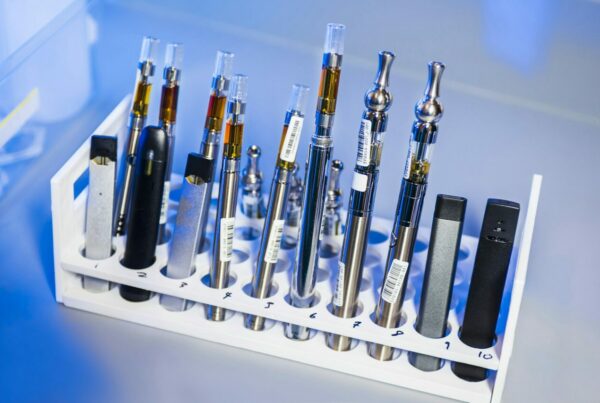N, N-Dimethyltryptamine (DMT) is a chemical compound observed in both plants and animals, known for its potent yet short-lived psychedelic effects when ingested.
Emerging research indicates that DMT, which naturally exists in the human body, plays crucial roles in both peripheral and central nervous systems and may serve as a neurotransmitter.
DMT can provoke strong psychedelic effects, yet it rarely results in adverse reactions, except for the potential risk of cardiovascular complications when administered in large quantities through injection.
Let’s explore DMT and its diverse roles. These roles range from its use for recreational purposes to its intriguing potential in scientific research and therapeutic applications.

A Brief Introduction to DMT: What is it?
| Aspect | Details |
| Name | N, N-Dimethyltryptamine (DMT) |
| Classification | Indole alkaloid |
| Occurrence | Naturally found in a variety of plants and animals |
| Psychoactive Effects | Brief, yet intense psychedelic experiences upon consumption. |
| Method of Consumption | It can be smoked, injected, or swallowed. |
| Duration of Effects | Short duration, typically between 5 and 30 minutes. |
| Chemical Structure | Comprises a tryptamine core with two methyl groups attached to the amine nitrogen atom. |
| Metabolism | Rapidly metabolized by the body, decomposed by monoamine oxidase (MAO). |
| Cultural Use | Historically used in various ceremonial and shamanic rituals by native cultures. |
| Other names | Dimitrifantasiabusinessman’s tripBusinessman’s special45-minute psychosisspiritual molecule |
The Role of DMT in Mental Health
N, N-Dimethyltryptamine (DMT), a compound famed for its potent psychedelic effects, is gaining attention for its potential benefits to mental health. Despite its conventional association with intense visionary experiences, recent research suggests a correlation between DMT and psychological well-being.
Effects on Psychological and Emotional Improving Well-being
DMT is known for its psychedelic effects that can evoke deep emotional reactions and alter states of consciousness. This property may pave the way for new therapeutic approaches to address mental health conditions, facilitate emotional processing, and offer new perspectives on personal traumas.
Impact on Neuroplasticity and Brain Function
Research suggests that DMT may influence neuroplasticity, enhancing the brain’s ability to adapt and reorganize. Investigating its impact on synaptic plasticity and neural connections could reveal potential treatments for disorders related to neural maladaptation.
Exploring Therapeutic Applications for Mental Health Conditions
Early studies imply DMT’s potential as a treatment for conditions such as depression, addiction, and PTSD. Its ability to provoke mystical or spiritual experiences might offer a fresh approach to psychotherapy and aid in transforming negative cognitive patterns.
Understanding the natural presence of DMT within the body and its role in mental health resilience, stress response, and psychological well-being may lead to novel therapeutic strategies. Gaining insight into how the body manages internal DMT levels could open new avenues for treatment.
DMT’s Role in Addressing Mental Health Conditions
| Mental Health Disorder | Description | DMT’s Potential Efficacy | Benefits |
| Depression | A mood disorder that involves persistent sadness, lack of interest, and reduced motivation | Preliminary research suggests DMT might alleviate symptoms by evoking deep emotional experiences. | Its rapid onset and ability to provoke transformative experiences may introduce innovative therapeutic techniques for reconfiguring negative thinking patterns and enhancing emotional processing |
| Post-Traumatic Stress Disorder (PTSD) | A mental health condition resulting from traumatic events that can cause flashbacks, severe anxiety, and intrusive thoughts | Early studies hint at DMT’s potential to manage symptoms by prompting spiritual or mystical experiences that could help patients reframe traumatic memories | DMT’s potential to induce altered states of consciousness could assist in emotional processing and offer new perspectives on traumatic experiences |
| Addiction | A complex disorder characterized by compulsive engagement in rewarding stimuli despite adverse consequences | Certain studies suggest DMT’s potential role in breaking addictive behaviors and reducing substance cravings | DMT’s capacity to trigger intense and transformative experiences may help individuals alter their behavioural patterns and confront their underlying causes of their addiction |
Approach to Using DMT
DMT, renowned for triggering short yet potent psychedelic experiences, can be utilized in multiple ways. The chosen method of administration is often dictated by the desired intensity and duration of the experience.
Inhalation:
When inhaled through a pipe or vaporizer, DMT requires meticulous temperature control to prevent the substance from overheating and burning. The psychedelic experience onset is almost instant when DMT is inhaled, typically persisting between 5 to 15 minutes.
Oral Consumption:
Oral ingestion of DMT triggers slower onset effects that last considerably longer, often for several hours. This is due to the slower degradation of DMT when combined with an MAOI.
Injection:
DMT can be directly injected into the bloodstream for rapid and potent effects.
This method induces an immediate and potent experience, however, it requires precision in dosage and entails greater risks.
Insufflation (Snorting):
Snorting DMT results in a slower onset of effects compared to inhalation, but may provide a more prolonged experience.
Sublingual or Buccal Administration:
When absorbed through the oral mucosa, this method presents an alternative to inhalation and offers a more extended, albeit less intense, experience.
Determining Therapeutic Dosage: N, N-Dimethyltryptamine (DMT)
For inhalation, the recommended dosage lies between 20 to 40 mg, while for intravenous administration, the suggested dosage is 0.2 to 0.4 mg per kg of body weight. These dosage recommendations are mainly applicable to clinical research and are particularly relevant for intravenous administration.
- Higher doses administered intravenously are associated with intense visuals, temporary loss of control, and a mixed state of anxiety and euphoria
- Fascinatingly, lower doses have exhibited less desirable effects
- Recreational doses of inhaled DMT generally range from 40 to 50 mg, sometimes even escalating to 100 mg
- Different doses of intravenous People who have had near-death experiences involving DMT (7, 14, 18, and 20 mg solutions) have reported lasting enhancements in their mental wellbeing.
Availability of DMT
Osmosis – 4-ACO-DMT Ethereal Essence Tincture
This tincture claims to contain 4-Acetoxy-N, N-dimethyltryptamine (4-AcO-DMT), a type of DMT. Tinctures are liquid extracts designed for oral intake, and this specific product might provide a distinctive experience compared to conventional DMT.
Lucid Supply Co. – 5-MeO DMT Vaporizer
This product is a vaporizer that delivers 5-Methoxy-N, N-dimethyltryptamine (5-MeO-DMT), a substance known for its potent, transformative, and often transient experiences. 5-MeO-DMT is the active ingredient in this device.
Integral Alchemist – Acacia – 1ml DMT Vape Cartridge
The DMT vape cartridge from Integral Alchemist comes pre-loaded with N, N-Dimethyltryptamine. This product is likely aimed at those who favor a subtle and convenient method of DMT consumption.
Deadhead Chemist – 5-Meo-DMT Cartridge
Enclosed in this cartridge is 5-Methoxy-N, N-dimethyltryptamine (5-MeO-DMT), a substance known for its deep and powerful effects.
Potential mental health benefits may be associated with personal growth, spiritual experiences, or therapeutic applications aiming to enhance emotional wellbeing.
Deadhead Chemist – N, N DMT Cartridge
Another offering from Deadhead Chemist, this cartridge houses the classic N, N-Dimethyltryptamine. Cartridges provide a simple method of DMT consumption, ensuring a more consistent and stable experience.
Concluding Remarks
The use of N, N-Dimethyltryptamine (DMT) in
How to ensure the safety and efficacy of DMT therapy?
It is essential to use DMT products from reliable sources. For instance, trusted platforms like Shroom Dudes Canada Online Dispensary can provide a variety of trustworthy options and guidance.
Mental health therapy is a fascinating yet complex journey. The ability of the compound to catalyze intense but ephemeral psychedelic experiences creates room for innovative therapeutic approaches.
Early research indicates a potential role in emotional processing and personal growth. Thus, the prominent effect of mental health therapy necessitates careful consideration and judicious use.
Frequently Asked Questions:
How do various DMT products affect mental health differently?
For instance, vaporizers might have immediate effects, while tinctures or vape cartridges can provide more controlled and steady doses.
Incorporating derivative compounds or 5-MeO-DMT can result in diverse degrees of intensity and different mental health effects.
These slight differences underline the importance of selecting a DMT product based on individual needs and mental health goals.
Does DMT contribute to enduring changes in mental health and personal development?
There are accounts indicating that DMT-induced experiences might have long-term effects on mental health and personal development.
Experiences of profound impact or transformation, such as those akin to near-death experiences, are often associated with reports of continuous positive changes in psychological health and personal growth.
Although these experiences are intense and short-lived, they frequently lead to introspection, spiritual revelations, and a sense of unity or enlightenment.
These experiences often result in a renewed perspective on life, enhanced emotional resilience, and an increased sense of life appreciation.
How should one use DMT for mental health purposes effectively?
It’s essential to make informed decisions, which involve thorough research and understanding of the compound’s effects.
Advice from mental health professionals or seasoned users can provide valuable perspectives on potential risks and advantages.
Comprehending personal tolerance and mental preparedness is also crucial, as is ensuring a supportive and safe environment for the experience.
What distinguishes DMT from other psychedelic therapies such as psilocybin or LSD in the context of mental health treatment?
DMT varies from other psychedelics like psilocybin or LSD in terms of its effects, duration, and intensity. Its shorter duration necessitates unique therapeutic approaches in mental health, distinctly different from those applied for more extended-lasting psychedelics.
Recommended Additional Reading:

 Click here to learn more about DMT.
Click here to learn more about DMT.



